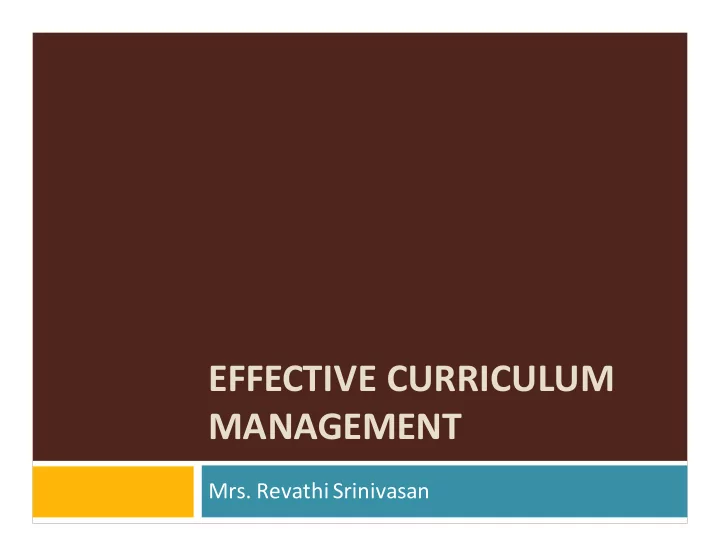

EFFECTIVE CURRICULUM MANAGEMENT Mrs. Revathi Srinivasan
The present student � Seeks relevance outside classrooms � Needs to be highly engaged � Has a choice and voice in the learning � Includes higher order thinking –creativity and innovation � Tasks elicit evidence of learning
The Philosophy of Curriculum � Creation of new knowledge � Concept of self –worth and worth of others � Develop lively, enquiring minds ,ability to question and apply themselves to tasks � Appreciate uniqueness of every human being � Joy of learning and living � Skills
Seven Survival Skills � Effective oral and written communication � Accessing and analyzing information � Collaboration � Agility and adaptability � Critical thinking and problem solving � Initiative and entrepreneurialism � Curiosity and imagination
An Effective Curriculum The 3 C’s for the success of the The 3 components of a Curriculum Curriculum Planning Execution Evaluation
Core Components • Content and hidden curriculum Planning • Process - participative classroom Management Execution Evaluation • Formative and Summative
What Schools Should Teach Judgment –focus on the present, more than one solution Critical Thinking - critique ideas and explore with them Meaningful literacy – create multiple forms of literacy Collaboration – provision to learn to work with others collectively, cooperatively and in harmony Service - creation of conditions to make a contribution to larger community
The Path Theme ‐ based learning S.P.I.C.E K.A.S.H. Internships Student driven research projects Authentic service learning C.I.A model
Theme Based Learning The Project Method
Salient Features Involvement and Involvement and Fosters responsibility development in students of the child Learning by doing Bridges the gap between Bridges the gap between theory and practice Motivation from within Student centric Conducive environment Conducive environment Innovative method of suitable for learning teaching Activity oriented Activity oriented
Key takeaways for students Application Skills Group learning Doing by and team work understanding Self learning Development skills of basic skills Communication skills
Procedure Planning Selection of theme Ensuring minimum competency level Drawing up the webs Follow up Evaluation
Competencies Developed Self direction Problem Decision Solving making skills Interpersonal Inventiveness communication Integrative skills
Carpool project by Std. 3 students
SPICE S imilarities And Variety P atterns I nteraction and Interdependence C ontinuity and Change E volution and Adaptation
Project Telephone SIMILARITIES between VARIETY (Differences) old and new between old and new telephones telephones � Metallic body v/s plastic body � Means of With Cord v/s cordless � Communication Fewer people with access to telephony � v/s large market access � Technology ‐ Sound Disturbance I connections v/s clarity � Waves � Monotonous ring tones v/s � Instrument is essential polyphonic/ music tones � Operator help required v/s no such � Need numbers to dial requirement � No other features v/s conferencing, caller id, speaker phone, answering machine etc
Project Telephone Patterns Interaction and Interdependence � Still remains the � Integral part of everyone’s life quickest means of � Everyone is always communication accessible � Dial—it rings– is � Has made the world answered—2 people smaller talk � Booming business � Instrument must have 2 � Major source of ends ‐‐‐ earphone & information mouthpiece � All professions are directly or indirectly dependent on it
Project Telephone Change and Evolution and Continuity Adaptation � The telephone’ness’ remains � From a luxury item to a � From a crude hollow wire modern necessity ‐‐‐ it’s attached with empty cans been a long journey for at the two ends to a mini computer of the palm Graham Bell’s invention!!!!! � Modern technology on � A Modern Marvel ‐ Tribute which the mobile works to Science & Technology � Everyday there’s a new additional feature available
K.A.S.H Know ledge what student should know at different age level Attitudes values / ethics , towards the dynamic society Skills Coping skills/ life skills Habits A way of life
Evaluation
CIA Model Curriculum Integration & Adaptation Class room Industrial Curriculum Requirement Science History Trade Geography EVS Industry Fine Arts Art Finance Maths Integrated Activity
Key Criteria � Utility : Will the knowledge or skill enhance long ‐ term employment � Social Responsibility : Will the content help citizens participate in making social and political decisions? � Intrisinic value of knowledge : Does the content have pervasive cultural significance? � Philosophical value : Does the content help individuals ponder the enduring questions of what it means to be human? � Childhood Enrichment : Will the content enhance the unique experiences and values of childhood?
Thank You
Recommend
More recommend